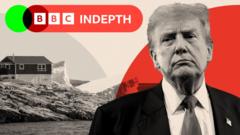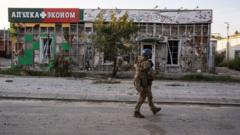With Davos set to tackle pressing issues like the Ukraine conflict and economic instability, the anticipation surrounding Trump's presence reflects deeper anxieties about global relations and U.S. policies.
Trump's Davos Debut: A Global Concern Amidst Uncertainty

Trump's Davos Debut: A Global Concern Amidst Uncertainty
As Donald Trump's second inauguration approaches, Europe is on edge about his potential impact at the World Economic Forum.
Davos is around the corner, coinciding with the inauguration of Donald J. Trump into his second term, and the atmosphere in Europe is thick with apprehension. Hubert Védrine, a former French foreign minister, likens Trump to an "asteroid heading for Earth," foreshadowing discussions that are likely to dominate the elite gatherings in the Swiss Alps this week.
Trump's rhetoric has been punctuated by threats of massive tariffs and suggestions about increasing U.S. involvement in Europe's defense with heavy strings attached, such as demands for increased military spending from European nations and a reduction in their trade surpluses with the U.S.
Analysts suggest that Trump's communication style – big threats followed by bargaining – means that while he may cause disruptions, the situation is fluid. As former national security adviser John Bolton described, navigating Trump's policies often felt akin to "living in a pinball machine," indicative of rapid shifts in focus.
At Davos, the ongoing war in Ukraine is expected to take center stage. Trump asserts that he could resolve the conflict in a day, a claim that most observers regard with skepticism, including his own advisor for Ukraine, Keith Kellogg. As the conflict drags on, negotiations might take precedence in the upcoming spring, highlighting critical questions about what terms would be acceptable for peace.
Putin's Russia, still shoring up its resources despite facing economic challenges, continues to push forward in its conflict with Ukraine, presenting the war as an existential battle against the West. Analysts are observing that with 70 percent of Russian forces being contract soldiers, the Kremlin is structurally equipped to sustain its military endeavors amid heavy casualties.
With mounting questions surrounding Trump's future decisions regarding international relations and the ongoing crisis in Ukraine, Davos may just be the stage where these global dynamics are made even clearer.
Trump's rhetoric has been punctuated by threats of massive tariffs and suggestions about increasing U.S. involvement in Europe's defense with heavy strings attached, such as demands for increased military spending from European nations and a reduction in their trade surpluses with the U.S.
Analysts suggest that Trump's communication style – big threats followed by bargaining – means that while he may cause disruptions, the situation is fluid. As former national security adviser John Bolton described, navigating Trump's policies often felt akin to "living in a pinball machine," indicative of rapid shifts in focus.
At Davos, the ongoing war in Ukraine is expected to take center stage. Trump asserts that he could resolve the conflict in a day, a claim that most observers regard with skepticism, including his own advisor for Ukraine, Keith Kellogg. As the conflict drags on, negotiations might take precedence in the upcoming spring, highlighting critical questions about what terms would be acceptable for peace.
Putin's Russia, still shoring up its resources despite facing economic challenges, continues to push forward in its conflict with Ukraine, presenting the war as an existential battle against the West. Analysts are observing that with 70 percent of Russian forces being contract soldiers, the Kremlin is structurally equipped to sustain its military endeavors amid heavy casualties.
With mounting questions surrounding Trump's future decisions regarding international relations and the ongoing crisis in Ukraine, Davos may just be the stage where these global dynamics are made even clearer.























